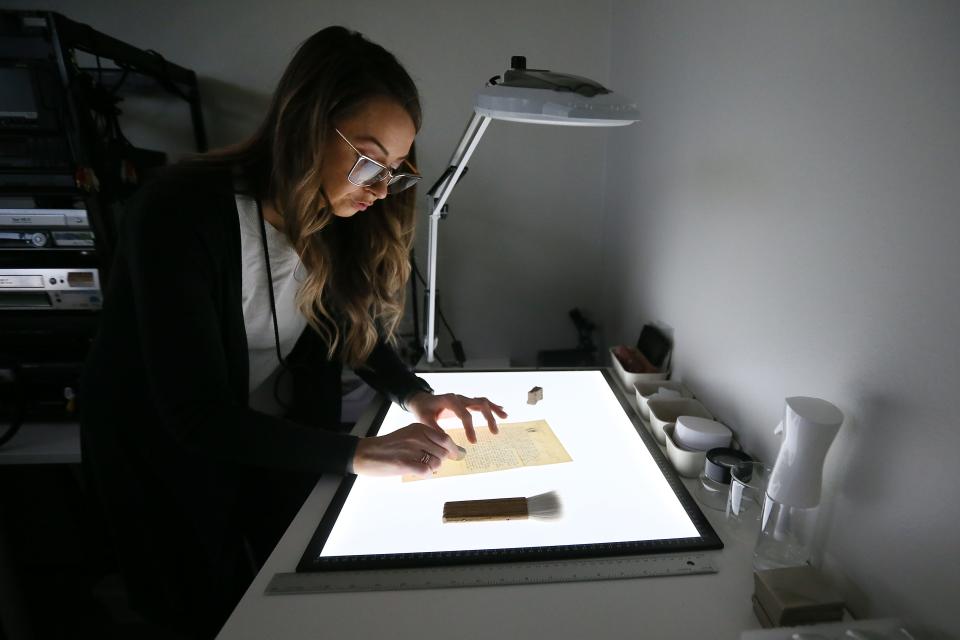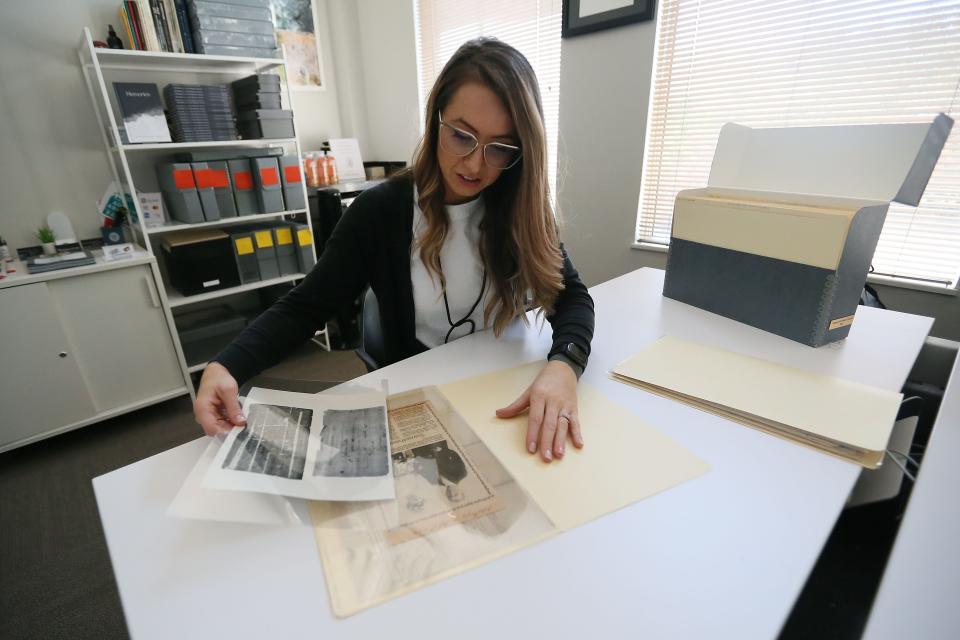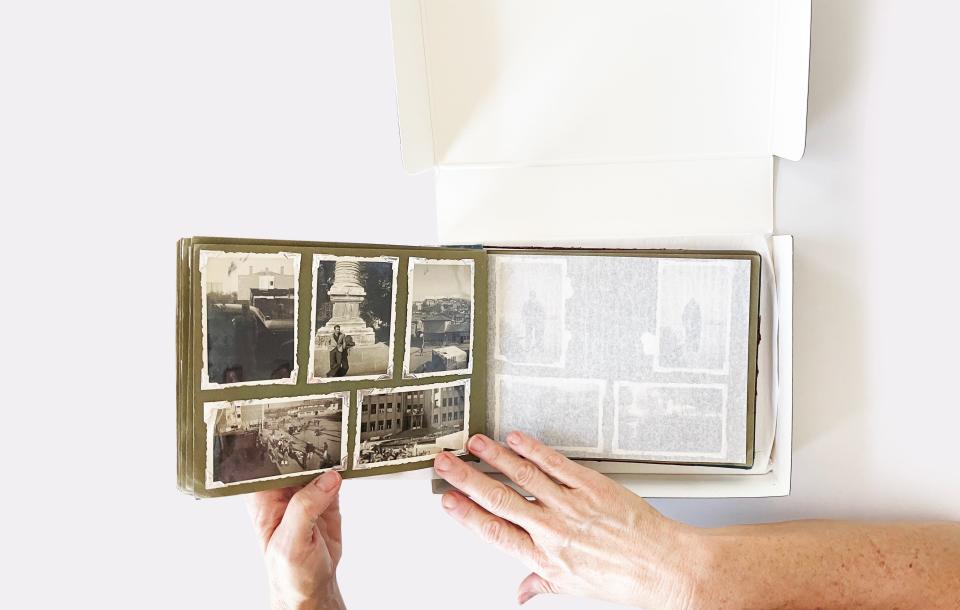Texas expert shares tips on preserving your family's personal papers and photos
Context.
That's the critical factor to consider when preserving, cleaning, organizing and digitizing your personal papers and photos, according to archival expert Brooke Lake.
"If you've got a photo, don't put it into a scrapbook," Lake, 37, says. "Scrapbooks are terrible. Please don't scrapbook. Tape is bad. Glue is bad.
"Turn the object over and put the crucial context on the back in pencil. Not ink, which bleeds. Date. Place. Names of people."
As simple as that.
Lake, who founded Austin personal archiving company Monocurate in 2021, generously shares tips that everyone seeking to protect a personal legacy could use.
"Store your papers and photos inside, preferably in an interior closet," she says. "Away from exterior windows, doors — and any light!"
Light, after all, is among the worst decomposing threats to any precious thing on paper.
More history: An Austin real estate mystery: Who bought historic Pease Mansion?
Don't throw things out just because you can't figure out who would be interested in them.
"There will always be somebody," Lake says. "Even if it is just one person."
Lake uses her domestic experience with fragile objects as an example.
"I have three kids," she says. "I've been collecting all these art projects for years. What's the point if they are sitting in a box in the garage?"

Ways to remember
Not everyone can afford an expert.
Monocurate's full-service rates start at $75 an hour, after a free consultation.
Yet if you discover, say, a photo album in the attic of compelling images from World War II, as one of Monocurate's clients did, and that history is important to you, their services might be the answer to your prayers.
Other personal archivists conduct business across the state, but they tend to focus on only one part of the archiving process.
"I expected women to be the main targets for my business," Lake says. "But it has been middle-aged or older men, who intended to do the work as something like a retirement project. Women are more likely to archive themselves."
Originally from Kalamazoo, Michigan, Lake followed her husband's job in Texas in 2014. She had studied historiography at Arizona State University and library and information science at Simmons College in Boston.
Texas history, delivered to your inbox
Click to sign up for Think, Texas, a newsletter delivered every Tuesday
Early on, she experienced the pointed loss of family and artifacts.
"My mom died when I was 16," she says. "It was a suicide. Nobody wanted to deal with it. We didn't go through her belongings. We just dumped everything out and threw it away. I was 16. I didn't know what an archive was."
(If you or someone you know is in crisis, reach out to the National Suicide Prevention Lifeline at 1-800-273-8255.)
Ten years went by before she and her siblings realized they didn't have any pictures of their mom, anything physical to remember her.
"We didn't even have pictures of our own childhoods," Lake says. "It took us 20 years to track down a few things, maybe a dozen between us."
By then, Lake knew about archives.

'We need to save family history'
After working at the Texas State Library and Archives Commission in Austin, she moved over to the city's prime private practice, Carrabba Conservation, which did high-level work on cleaning and preserving artifacts for major institutions, as well as private collectors. Yet during the pandemic, founder and owner Cheryl Carrabba decided to retire, and Lake was left at loose ends.
Instead of focusing on fixing things (conservation), Lake founded her fresh business on stabilizing and inventorying (preservation).
"Most everything goes into Mylar," she says. "Everything is reinforced. Everything is stabilized and reboxed."
Along with an assistant, Lake also digitizes home movies, photographs and documents.
"It's often stuff that people find when they start digging in a box," she says. "They didn't even know it existed. Things like a deceased mother's poetry, or water-damaged war memorabilia. No two collections have been alike."
Lake signs a confidentiality agreement with her clients, so family matters remain family matters. No names were shared while reporting this column.
"One person interested in genealogy received 250 letters that essentially said: 'You are part of my family,'" Lake says. "It's sort of information overload, 40 years of this man's tangible 'Googling' before the internet."
Lake says the process can be fun for clients and archivists.

"Everything is interesting," she says. "It's mind-blowing to see what people keep and what they store for the future. Things that they find important and put away in a junk drawer or a closet, but don't talk about it."
In a digital age, too, there will likely be fewer actual artifacts like these to pass along.
"As an older millennial, I'm among the last generation to have any tangible documentation of my childhood," Lake says, "what little I have."
In addition, as Texas archives and museums prove every day, family history becomes public history.
Lake: "We need to save family history."
Michael Barnes writes about the people, places, culture and history of Austin and Texas. He can be reached at mbarnes@statesman.com.
Finding help to preserve those photos and papers
Monocurate is a new company that can help you organize, preserve, clean and digitize your personal archives.
Where: 4413 Spicewood Springs Road
Rates: After a free consultation, rates start at $75 an hour.
Info: monocurateatx.com
Send more questions about your personal archives to mbarnes@statesman.com. I'll find the Texas expert for you.
This article originally appeared on Austin American-Statesman: Texas expert shares tips on preserving your personal papers and photos

